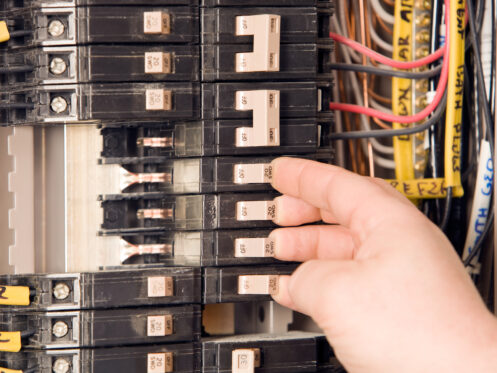Keeping your Norman home safe from power surges is a vital part of preventing electrical issues. So many homes today rely heavily on technology which requires electricity to run correctly. A power surge could cause extensive damage that could require costly replacements or repairs. Learning more about what you can do to protect your entire home from power surges will help to give you some peace of mind.
What Is a Power Surge?
Experts also refer to a power surge as transient voltage or a voltage surge. It is a brief and sudden increase in voltage that goes beyond a circuit’s standard electrical voltage level. These surges vary front a minor increase that you might not even notice to a massive spike that can lead to severe electronic equipment damage.
There are several reasons why a power surge might occur. Lightning strikes are a common cause. When it hits a utility pole or power line, it can send a huge electricity surge to the grid. Any home connected to this grid could experience a power surge.
Some large appliances might cause a small surge as they cycle off and on. They may impact sensitive electronics as the surges build up over time. If your home has issues with the electrical grid or faulty wires, intermittent power surges are possible. Over time, they could cause problems for your electronic devices.
A power outage might cause a surge upon restoration of your power. Referred to as a power spike, this could possibly damage any electronics that are turned on when the restoration of power occurs.
Damage due to a power surge could be gradual or immediate. Immediate damage could include complete failure especially to circuit boards, microprocessors and other sensitive components. Gradual degradation is also possible. This can occur due to repetitive surges over time that gradually weaken the internal components of electronic devices. It can result in sudden failure or malfunctions.
Whole-House Surge Protectors
A whole-house surge protector works by directing the excess voltage that occurs during a power surge away from your appliances and electronic devices. An electrician will install the main surge protector at your meter or primary electrical panel. Inside the main protector are surge protection devices (SPDs) that are capable of detecting spikes in voltage and then directing them away from the electrical system in your home. It diverts it to a ground wire that prevents it from getting to the wiring in your home after grounding the surge.
Your electrician might also recommend installing additional SPDs at certain outlets or circuits for additional protection. This is generally for sensitive areas with electronics that are especially expensive, such as a computer room or home theater.
Some systems for whole-house surge protection allow you to utilize multiple stages of protection. With this option, your system will have different components that can tackle different levels of surges. For example, the electrician might use gas discharge tubes to divert surges due to lightning strikes and metal oxide varistors to divert smaller surges.
Many modern systems have alarms or indicator lights to let you know that everything is working properly. The most advanced systems use remote monitoring to tell your service provider and yourself if servicing is necessary.
Uninterruptible Power Supplies
Uninterruptible power supplies are ideal for your servers, computers, home entertainment systems and other critical devices. These will provide a battery backup so that should a power outage occur, the connected device will keep running. They also help to provide additional surge protection. You might consider these devices to reduce surge protection while simultaneously preventing data loss during a power outage.
Point-of-Use Surge Protectors
Even with a whole-house surge protection system, you might want to protect some of your individual electronics. These are types of power strips or surge suppressors that help to stop the smaller surges within your home. An electrician can install them directly at the outlets you use to plug your individual electronics into. You want to ensure that they can absorb enough energy, so look at those that have a high joule rating.
Protect Communication Lines
In some cases, a power surge can get into your home via communication lines. Examples of these lines include cable TV lines, phone lines and internet connections. There are surge protectors specifically for your communication lines. Install these to prevent the surges from causing damage to any devices connected to your communication lines. These are especially ideal if you have home security devices or home automation systems that connect to communication lines in your home.
Smart Power Strips
Smart power strips work to protect against power surges while also conserving energy. You can individually control the outlets that are on the strips. Another feature is turning off devices automatically once they go into standby mode. These strips are ideal for entertainment centers and home offices where you have to plug in multiple electronics in a small area.
Lightning Protection Systems
Lightning is relatively common in Norman, so adding a lightning protection system is something to consider. These systems include components like conductors, lightning rods and grounding systems. They all work to divert lightning from your home and instead direct it into the ground.
HVAC System Protection
Power surges could cause damage to the compressors, motors and control boards of your HVAC system. Electricians can use specific surge protectors to prevent surges to the components of your HVAC system. They install them right at the unit to provide additional protection.
Regular Inspection and Maintenance
Having your home’s electrical system inspected annually is vital because it ensures that everything is functioning properly. Your electrician will also check your surge protection devices during this time. Surge protection devices can become less effective or wear out over time. If you notice any damage or reduction in effectiveness, you should call your electrician right away to come out and repair or replace them.
Unplug Electronics During Storms
While you cannot unplug everything, you should unplug everything that you are not actively using during a storm. Then, if the power goes out or lightning strikes, there are fewer devices that are at risk for damage. If the power does go out completely, you can unplug everything since you are not using them at all. Then, once the storms subsides and the utility company restores your power, you can plug everything back in.
Professional Electricians in Norman
It is important to take a multi-faceted approach to protecting your entire Norman home from power surges. Use a variety of methods to tackle this job so that you have the most protection possible. Our team of professional electricians can help you implement all of the measures necessary. We can also help to protect your home in other ways. Let us know if you need any help with other electrical needs, your plumbing or your HVAC system.
Call Norman Air in Norman today to learn more about whole house surge protection.

